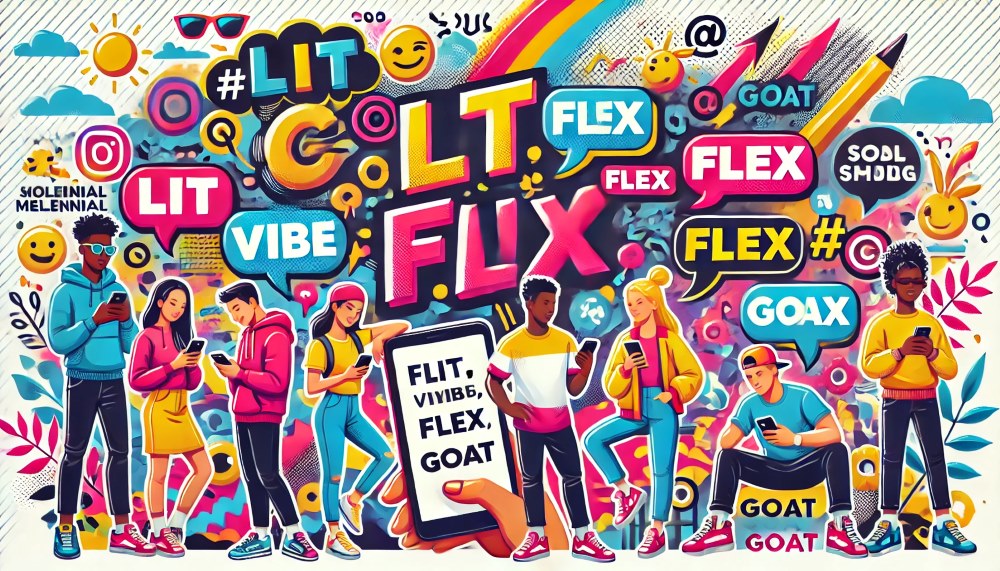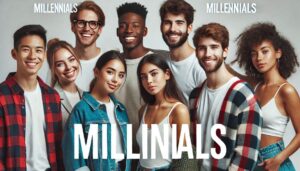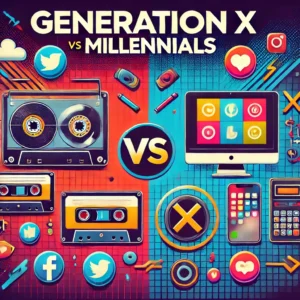No products in the cart.
Life Style
Decoding Millennial Slang: A Guide to Understanding Today’s Lingo
Millennial slang (Gen y slang words) is everywhere. It fills our social media feeds. It pops up in text messages. Understanding this unique language is key to connecting with younger generations. This article will explore the world of millennial slang. We will uncover the meanings behind popular terms. We’ll examine why this slang exists. Get ready to decode the language of millennials.
What Exactly is Millennial Slang?
Slang is not new. Every generation has its own unique words. Think about the “groovy” 60s or the “radical” 80s. Millennial slang is simply the slang of the millennial generation. This generation grew up with the internet. They experienced the rise of social media. These factors heavily influence their language. Millennial slang is constantly evolving. It reflects the culture and experiences of this generation.
Millennials are generally defined as those born between the early 1980s and the mid-1990s. They came of age around the turn of the 21st century. This period saw massive technological advancements. The internet became mainstream. Mobile phones became common. Social media platforms emerged. These technologies shaped how millennials communicate. Online interactions became a core part of their lives.
Millennial slang is often informal. It is playful and creative. It frequently uses humor and irony. Many terms originate online. They spread quickly through social media. Platforms like Twitter, Instagram, and TikTok are breeding grounds for new slang. Memes and viral content also play a big role. They introduce new words and phrases to the digital lexicon.
The Roots of Millennial Slang: Where Does it Come From?
Millennial slang is a melting pot of influences. Several key sources contribute to its creation. Understanding these sources helps to grasp the nuances of the language.
1. The Internet and Digital Culture:
The internet is arguably the biggest influence. Online communities foster unique language. Acronyms like “LOL” (laughing out loud) and “BRB” (be right back) emerged in early internet chats. These initialisms evolved into more complex slang terms. Online gaming communities also contribute. They introduce specific jargon and expressions.
Memes are another powerful force. A single image or video can launch a new phrase into widespread use. Think of “doge” memes, which popularized phrases like “much wow.” Viral videos can also introduce slang. A catchy line from a popular video can quickly become a meme. Then, it becomes part of everyday online communication.
2. Social Media Platforms:
Social media platforms are incubators for slang. Twitter’s character limit initially encouraged abbreviations. Hashtags (#) create trends and categorize topics. They can also give rise to new slang terms. Instagram’s visual focus promotes image-based slang. Captions and comments become opportunities to use trendy words. TikTok, with its short-form video format, is a slang powerhouse. Dance challenges and viral sounds often introduce new phrases.
3. Pop Culture and Entertainment:
Popular music, movies, and TV shows significantly influence slang. Catchphrases from songs often enter everyday speech. Think of iconic lines from movies that become cultural touchstones. Reality TV shows can also introduce slang. Unscripted moments and personalities often generate memorable phrases. Celebrities and influencers play a role too. Their language choices can quickly spread to their followers.
4. Humor and Irony:
Millennial slang often uses humor. Sarcasm and irony are common tools. Many slang terms are born from playful exaggeration. Think of terms that downplay serious situations. Or consider phrases that mock overly earnest behavior. This ironic tone is characteristic of millennial humor. It reflects a certain self-awareness and detachment.
5. Evolving Language and Creativity:
Language itself is constantly changing, and millennial slang is part of this natural evolution. Every generation creates its own linguistic markers, but millennials are particularly creative with language. They remix existing words, invent new ones, and give old terms fresh meanings. This linguistic playfulness keeps slang dynamic and ever-evolving
Popular Millennial Slang Terms and Their Meanings
Now, let’s explore some specific examples. Understanding these millennial slang terms will help you navigate online conversations. This list is not exhaustive. Slang is always evolving. But these examples offer a good starting point.
- Adulting: This term refers to behaving like a responsible adult. It often carries a tone of mild complaint or self-deprecation. Example: “I actually did laundry and paid bills today. I’m adulting so hard!”
- Basic: Describing someone or something as mainstream, unoriginal, or overly trendy. Often used negatively to imply a lack of individuality. Example: “Pumpkin spice lattes are so basic.”
- Bye Felicia: A dismissive way to say goodbye to someone you don’t care about. Originates from the movie “Friday.” Example: “She started complaining again, so I just said ‘Bye Felicia’ and walked away.”
- Clapback: A sharp and witty response to criticism or an insult. A verbal retaliation that aims to shut down the opponent. Example: “She delivered an epic clapback when he tried to criticize her work.”
- Drip: Refers to someone’s stylish and impressive fashion sense. Having “drip” means having great style. Example: “Look at his outfit, he’s got serious drip.”
- Fam: Short for “family.” Used as a term of endearment for close friends. Example: “What’s up, fam?”
- Feels: Short for “feelings.” Often used to express strong emotions, especially online. Example: “This song gives me all the feels.”
- Flex: To show off, boast, or brag about something. Often used with a slightly negative or ironic connotation. Example: “He’s always flexing his new car on social media.”
- G.O.A.T.: Greatest Of All Time. Used to describe someone or something as exceptionally excellent. Example: “Beyoncé is the G.O.A.T.”
- Hits Different: Describes something that is surprisingly or uniquely impactful in a good way. Example: “This coffee really hits different this morning.”
and more Gen y slang words…
- I Can’t Even: An expression of being overwhelmed, speechless, or unable to cope with something. Often used humorously. Example: “The traffic was so bad, I can’t even.”
- Keep it 100: To be honest, genuine, and authentic. To be real with someone. Example: “Just keep it 100 with me, tell me what you really think.”
- Lit: Exciting, cool, amazing, or excellent. Often used to describe parties or events. Example: “That concert was lit!”
- Low-key: Understated, subtle, or not very obvious. The opposite of “high-key.” Example: “I’m low-key obsessed with this new show.”
- Mood: Relatable. Used to express agreement or shared feeling. Example: (Sees a meme about being tired) “Mood.”
- No Cap: No lie, seriously, for real. Used to emphasize truthfulness. Example: “That movie was amazing, no cap.”
- Salty: Bitter, annoyed, or resentful, especially about something minor. Example: “He’s still salty that he didn’t get invited.”
- Shade: Subtle disrespect or insult. To throw shade is to subtly criticize someone. Example: “She was throwing shade at him the whole time.”
- Slay: To do something exceptionally well or impressively. To succeed spectacularly. Example: “She slayed that performance.”
- Tea: Gossip or inside information. “Spill the tea” means to share gossip. Example: “What’s the tea on what happened last night?”
- Vibe: The overall feeling or atmosphere of a person, place, or thing. Example: “This cafe has a really chill vibe.”
- Woke: Aware of and actively attentive to important facts and issues (especially social injustice). Initially positive, now sometimes used ironically. Example: “He’s very woke on social issues.”
The Impact and Future of Millennial Slang
Millennial slang has had a significant impact on language. It reflects cultural shifts and technological advancements. Its influence is undeniable.
Impact on Language:
Millennial slang has broadened the lexicon. It has introduced new words and phrases into common usage. Some terms have even crossed over into mainstream language. Words like “selfie” and “photobomb” originated in online slang. Now, they are widely accepted and understood. Millennial slang has also influenced sentence structure. Shorter, more direct communication is often favored. This reflects the fast-paced nature of online interactions.
Communication and Connection:
Slang acts as a social marker. It helps to create in-groups and identify members of a generation. Using millennial slang can signal belonging. It can show that you are “in the know.” It can facilitate communication among peers. However, it can also create generational divides. Those unfamiliar with the slang may feel excluded. Understanding millennial slang is crucial for intergenerational communication.
The Ever-Evolving Nature:
Slang is inherently transient. What is trendy today may be outdated tomorrow. Millennial slang continues to evolve rapidly. New terms emerge constantly. Old terms fade away. This dynamic nature keeps language fresh and exciting. It also means staying updated is an ongoing process.
The Future of Slang:
It is likely that future generations will continue to develop their own slang. Technology will undoubtedly play a role. Social media platforms will continue to be breeding grounds for new terms. The desire for unique expression and in-group communication will persist. Understanding the patterns of millennial slang can provide insights into future linguistic trends.
Embracing Millennial Slang
Millennial slang can seem confusing at first. It is a vibrant and dynamic part of modern language. Instead of feeling overwhelmed, embrace the opportunity to learn. Understanding millennial slang words (Gen y slang words) can enhance your communication skills. It can help you connect with a younger audience. It can also provide a fascinating glimpse into contemporary culture. So, next time you encounter a new slang term, don’t dismiss it. Look it up. Ask someone. You might just find yourself saying “lit” or “mood” in no time.







